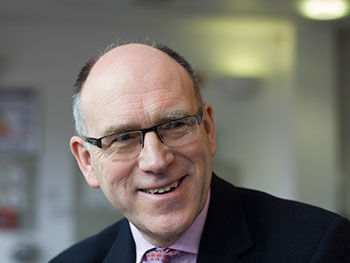University News Last updated 09 January 2017

The co-founder of charity Cure Leukaemia, Professor Charles Craddock, will receive an honorary doctoral degree from Birmingham City University this week.
Professor Craddock co-founded Cure Leukaemia in 2003. The charity aims to allow greater and quicker access to new treatments for patients with blood cancer in Birmingham and the West Midlands.
He is currently Director of the Blood and Marrow Transplant Unit at Birmingham’s Queen Elizabeth Hospital and Professor of Haemato-oncology at the University of Birmingham.
Professor Craddock said:
Professor Craddock trained in haematology at the Hammersmith Hospital, London, the Institute of Molecular Medicine at the University of Oxford and the University of Washington, Seattle, USA.
He is a recent President of the British Society of Blood and Marrow Transplantation and Chair of the UK Stem Cell Strategic Oversight Committee. He was Medical Director at Anthony Nolan from 2010-14, a charity which aims to save the lives of those living with blood cancer by matching patients with suitable donors.
As Transitional Director of Birmingham Health Partners he led the development of the £24 million Birmingham Institute of Translational Medicine, which opened in 2015. The centre helps to progress the very latest scientific research findings into treatments for patients with various health issues.
Professor Craddock’s main research interests include the development of novel drug and transplant therapies in myeloid leukaemias and he leads both the UK haemato-oncology Trials Acceleration Programme and the world’s second transplant trials network, IMPACT, which opened in October 2016.
In 2016, Professor Craddock was awarded a CBE for services to medicine and medical research.
Professor Craddock will receive his award on Tuesday 10 January at the Awards Congregation ceremony, held at Symphony Hall, Birmingham, which will celebrate the work and achievements of students graduating from the Faculty of Health, Education and Life Sciences.